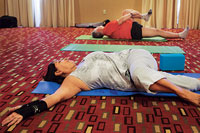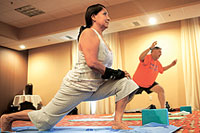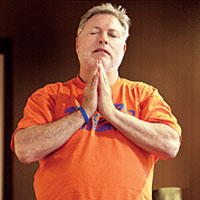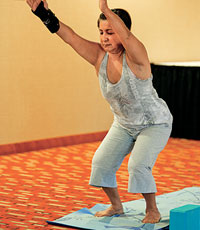Cancer survivors, caregivers reach for physical health, emotional well-being
"It gives students some control. When you have cancer you feel like you’ve lost control. Yoga offers a safe place for people to be with themselves."
In a meeting room on the UC Davis Health System campus, the yoga instructors direct and position their students through a powerful flow of movements, such as downward facing dog, warrior I and crescent lunge. Vinyassa yoga focuses heavily on breathing practices and mixes active and passive poses.
The weekly yoga sessions bring many benefits to the students. Studies show that the practice of yoga aids cancer patients and their caregivers in stress reduction, improved sleep and lowered blood pressure.
Jack Sanders is a prostate cancer survivor. He takes the class and now tries to incorporate some of the stretches and moves into his personal daily exercise routine. For him, the benefits go beyond the physical.
Studies show that the practice of yoga aids cancer patients and their caregivers in stress reduction, improved sleep and lowered blood pressure.
"It teaches the idea of letting the cares of daily life float away," he says. "I started to really get the idea of the importance of the breath and posing."
For people who have had cancer, yoga can be emotionally empowering, says Cataldo, 32, herself a breast cancer survivor.
"It gives students some control," she says. "When you have cancer you feel like you’ve lost control. Yoga offers a safe place for people to be with themselves."
Rindell, 24, says the practice "brings an awareness, a relaxing release," to participants.
"It builds strength and shows them that even though they are going through so much, their bodies are able to do more than they are aware they can."
Marlene von Friederichs-Fitzwater, associate professor of hematology and oncology, and director of outreach research and education at the cancer center, was instrumental in developing the yoga program, which started in June.
"The studies tell us that it is an excellent way to help patients and survivors deal with insomnia, fatigue and even physical pain," says von Friederichs-Fitzwater. "It’s an excellent, gentle kind of body work you can do that actually relieves physical symptoms."
Rindell and Cataldo say they adapt the class to accommodate students at different stages of treatment and recovery. They move more slowly through some poses and sometimes hold poses a bit longer than is typical.
"We modify it a bit because the patients haven’t moved like this for a long time — or ever," says Rindell, who works by day as an administrative assistant in the Health Sciences Development office.
Cataldo began her yoga practice shortly after she was diagnosed with cancer in 2010. She says she was looking for a "lifestyle change," and yoga helped her to make a shift in perspective. Prior to her yoga practice, she says she experienced much higher levels of stress in her job as a deputy district attorney for Sacramento County. Now, she faces the same grueling deadlines, but doesn’t feel as much stress when they loom. She thinks yoga helped her make a mental shift.
"When you get to practice being calm, you seem to bring it out to your life," she says.











